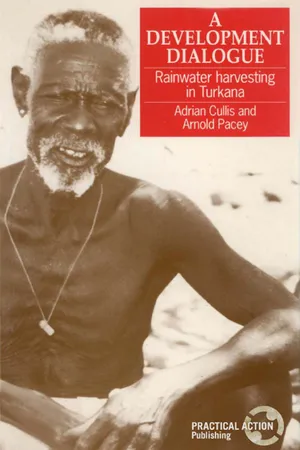Development Dialogue
About this book
The African Sahel has one of the poorest regional economies in the world. Within it pastoralists are particularly vulnerable because development policy has often failed to address local concerns. By contrast, the Turkana rainwater harvesting project described in this book stands out in its simplicity - a basic water conservation technology based on priorities identified by local people, adapted by them, and in which local pastoralists and gardeners take full responsibility for the control and administration of their work. The authors illustrate the project's progress through a series of descriptive scenes which discuss the successes and learning experiences. The whole process, covering the years 1984 to 1990, was one of continuous dialogue between western technological principles and experience, and local observation and knowledge - resulting in a successful learning process promising to empower local people to better cope with economic pressures and the harsh environment. Written and designed for development workers, farmers and agricultural fieldworkers, researchers and extensionists, as well as project planners and advisors, this companion to Rainwater Harvesting has lessons in participatory techniques for all those engaged in projects involving development agencies and local people.
Tools to learn more effectively

Saving Books

Keyword Search

Annotating Text

Listen to it instead
Information
Table of contents
- Title Page
- Copyright Page
- Table of Contents
- Acknowledgements
- Preface
- Abbreviations and Acronyms
- Glossary
- 1: The Context of a Famine, 1979-84
- 2: History and Development to 1984
- 3: The Pastoral Economy and Turkana Institutions
- 4: Gardens and Animal Draught, 1985
- 5: New Locations and Evolving Management, 1986-7
- 6: The Start of Self-Management, 1987-90
- 7: Conclusion: Dialogue-Based Development
- References
Frequently asked questions
- Essential is ideal for learners and professionals who enjoy exploring a wide range of subjects. Access the Essential Library with 800,000+ trusted titles and best-sellers across business, personal growth, and the humanities. Includes unlimited reading time and Standard Read Aloud voice.
- Complete: Perfect for advanced learners and researchers needing full, unrestricted access. Unlock 1.4M+ books across hundreds of subjects, including academic and specialized titles. The Complete Plan also includes advanced features like Premium Read Aloud and Research Assistant.
Please note we cannot support devices running on iOS 13 and Android 7 or earlier. Learn more about using the app
